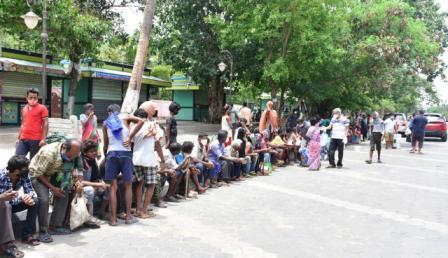Bhubaneswar: It’s another morning here and a 26-year-old Heena Sheikh scoots off to her nearest general store but not to buy ration, rather to beg from those who can lend a helping hand to her.
A migrant from neighbouring Chhattisgarh, Heena is one of the many who have borne the brunt of the month-long lockdown clamped in the state including the Capital city. Heena, a hapless mother of four and a widow, used to sell balloons and brooms at traffic signals until lockdown strangled her
livelihood.
“My husband passed away recently which brought me immense misery. My eldest son, who is at his tender age of 15, works as a daily wager but he is left with no work. I am left with no other option than to beg for food. Even though some benevolent people buy me daily ration, it becomes hard to stock up the food for weekend shutdowns,” Heena lamented.
While the entire state is under Covid-induced lockdown, tales of such misery are many among the urban poor even in the Capital city. With restrictions imposed on most commercial activities, one can witness scores of destitute lined up at Master Canteen, KIIT Square, Rupali Junction, railway station and other prominent locations to receive meals and food from benevolent individuals. Even though there is no official data available, individual studies estimate that the state capital has about 10,000 people living below the poverty line. A research study by a group of urban planners also suggested that these figures may increase or decrease given the nature of floating population to the state capital.
In April, when there was only weekend shutdown in City, the Bhubaneswar Municipal Corporation (BMC) had allowed about nine voluntary organisations to distribute food among the poor and destitute.
Moreover, private bodies and individuals were also roped in to reach out to the urban poor during lockdown.
“As per the state government’s instructions, we have kept Aaahar centres in the city functional. We have also roped in about 40 NGOs that are involved in distribution of food and other essentials among the poor. We have also rehabilitated many destitute at different shelter homes where necessary care is being given,” said BMC Deputy Commissioner, Welfare, Kamalakanta Behera.
However, urban planners and activists here say that the measures taken by the civic authority are not enough. “The condition of poor on city outskirts like Jatni, Mendhashala, Pahala is even worse. No one reaches out to them. Moreover, these destitute have no idea which NGOs are operating in their area and how to contact them. As their means of earning have been shut, they are left with nothing to arrange even one meal a day for survival,” said Susanta Behera, a right to food activist here.
Urban poor left to beg as lockdown continues
